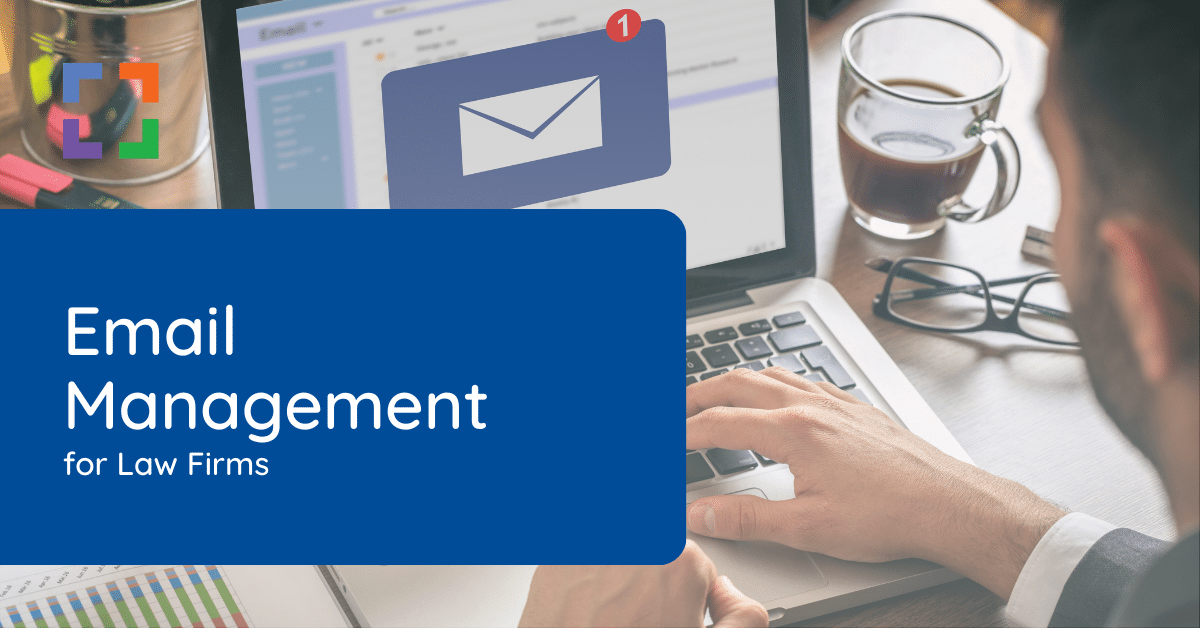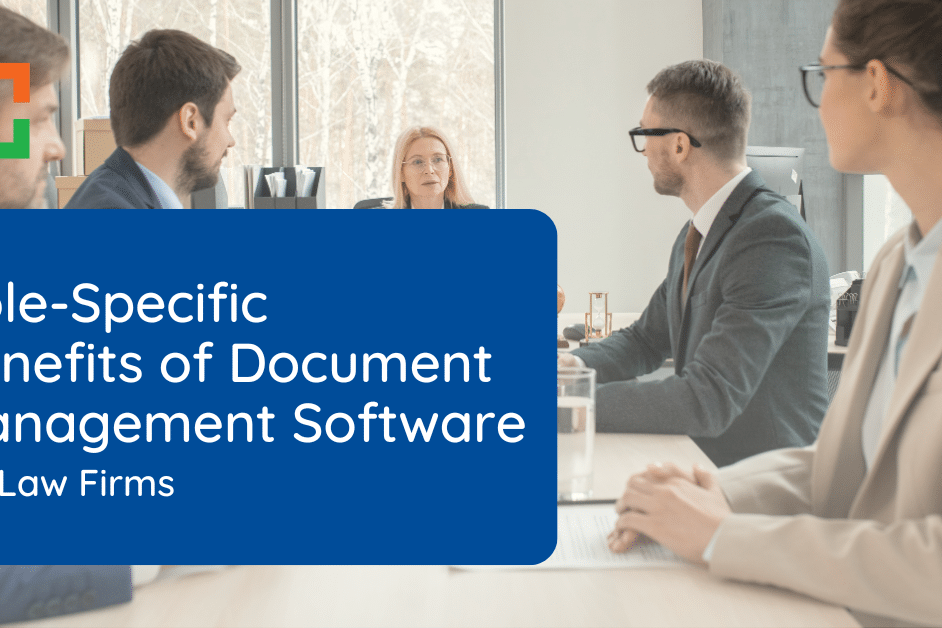Document Management for In-House Legal Teams
Born in the Cloud. Built for Legal Teams.
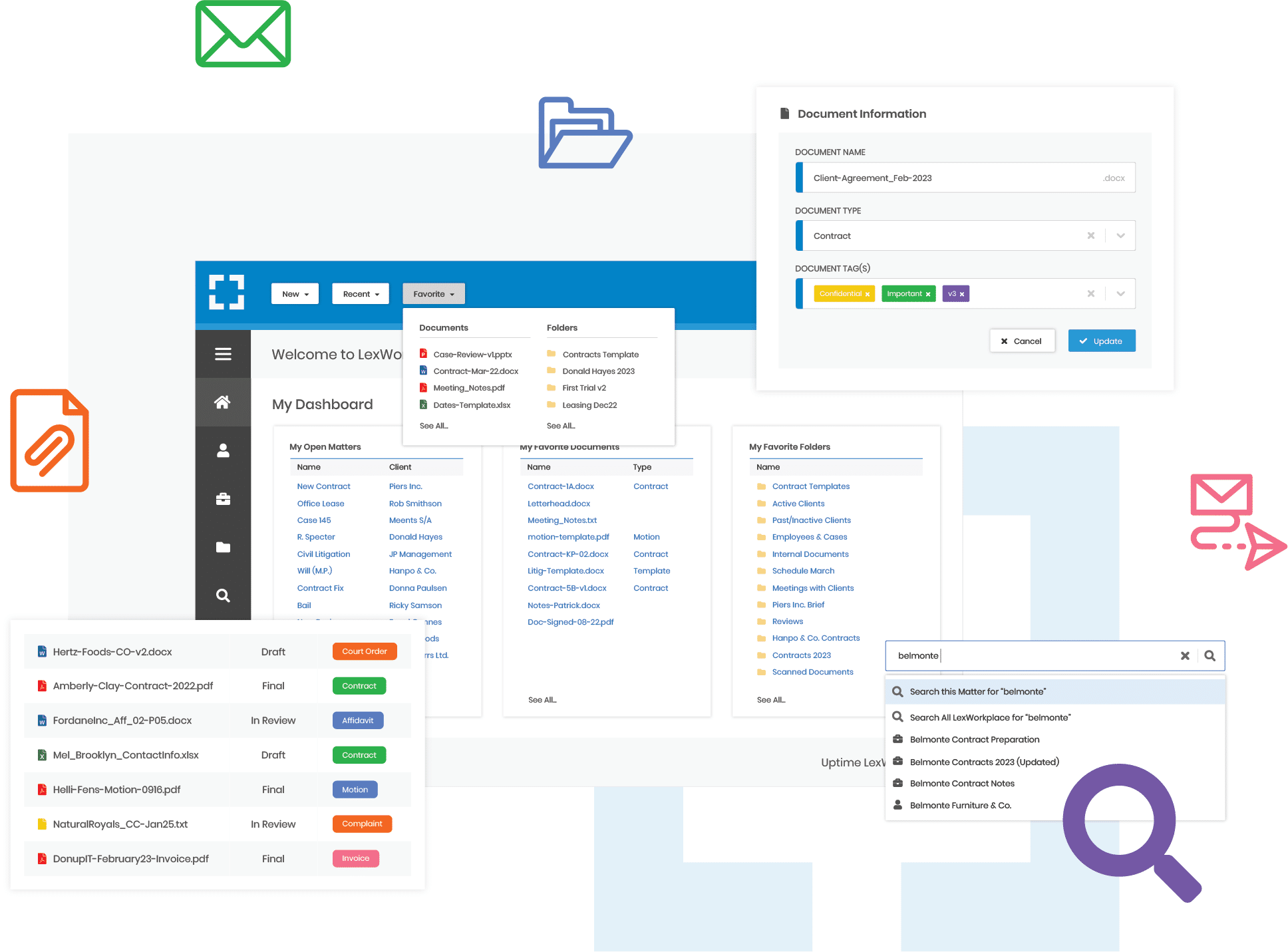
LexWorkplace Features
Manage Documents, Email and Collaborate With Your Team.
Works with Windows and Mac OS.
Matter-Centric
Manage Documents, Email & Notes by Matter
Store Anything
Store documents, video, audio and more
Tagging & Profiling
Create and apply tags & properties to docs
Email Management
Save emails to a matter right from Outlook
Version Management
Effortless document version management
Office Integration
Save Office docs directly to LexWorkplace
Geographic Redundancy
Multiple independent data centers
One-Click Open & Save
One click to open a doc, one click to save
Two-Factor Authentication
Enable TFA for added data security
Powerful Search
Instant search across documents and email
Clio Integration
Integrates with Clio Manage
Data Encryption
Complete encryption in-transit and at-rest
Document Preview
Full-text Document & Emai Preview
Integrated OCR
Automatic conversion of PDF files to full-text (coming soon)
External Sharing
Securely send documents to clients & third parties
In This Article
- Introduction to In-House Legal Document Management Systems
- Common File Storage Methods for In-House Legal Teams
- 3 Key Signs You Need a More Robust File Storage Solution
- The Solution: Tailored In-House Legal Document Management
- How to Evaluate In-House Legal Document Management Systems
- Asking Upper Management for a Document Management System
- FAQs - In-House Legal Document Management Systems
- Document Management Software Made for Legal Teams
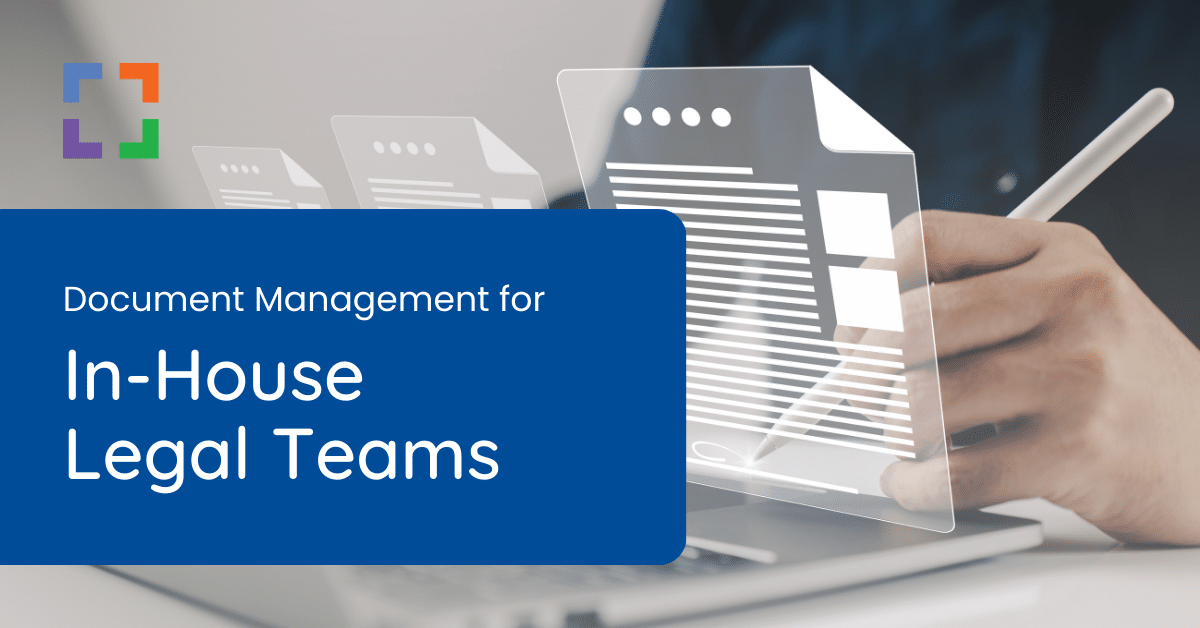
Introduction to In-House Legal Document Management Systems
In-house legal teams are unique in many ways. For example, instead of serving a mix of clients, they’re dedicated to the legal representation of their organization.
Another unique attribute is the in-house team’s need for legal-specific and comprehensive in-house legal document management system.
In-house legal teams, by default, are often “stuck” with whatever corporate tools the organization uses, from on-premise file servers to Outlook. These tools are often not enough for the robust document management requirements legal teams have, however. Plus, what works for the broader organization may not work for the legal team.
In-house legal departments often have more sophisticated needs when it comes to managing documents, email and other content.

Luckily, there’s a solution: choosing cloud-based document management for your In-House Legal Document Management System (DMS).
In this guide, we’ll discuss everything you need to know about document management, from common storage methods to finding the right DMS for your team.
You’ll walk away understanding what a DMS is, why you might need one, and your next steps (including how to convince management that you need better tools).
Let’s get to it.
Related – Best Legal Document Management Software: Evaluate various document management software to ensure your firm’s utilizing the best option.
Common File Storage Methods for In-House Legal Teams
Some file storage methods have become the default for larger organizations that need to manage and store millions of records, customer data, and files. While there are redeeming features of these methods, they don’t quite fit the bill for legal teams.
File Servers
Larger companies often have one (or more) file servers that act as the central storage system for the entire organization. These are often configured as one or multiple mapped drives and are referred to as the “S:\ drive” or “G:\ drive.”
File servers and mapped drives serve the needs of a broader company. They indeed act as a place to store and share files between company departments and across locations.
Legal teams, however, require matter-centric organization.
Legal teams should be able to store everything related to a specific legal matter in a single in-house legal document management system. This includes everything from documents, video, audio, email, and notes. That’s something a G:\ drive can’t do efficiently.
Basic Cloud Storage
Another common file storage method is the use of basic cloud storage such as Dropbox, OneDrive, or Google Drive. Using these tools, your files are stored inside of the cloud instead of your on-premise servers.
While moving your files to the cloud in this way is a great first step, these tools are quite basic. They often fall short when it comes to the specialty needs of legal professionals. You can view these tools as basic cloud-based filing cabinets—no more, no less.
3 Key Signs You Need a More Robust File Storage Solution
Not sure if you need something more for your in-house legal team? There are several symptoms you should be on the lookout for that highlight your need for a better file storage solution.
1. Fragmented Files
Do you often need to search for case-specific files inside multiple tools?
For example, you might have to search Outlook for case emails and the server for documents. You may even have moments where you have to reach out to other team members to determine where they saved a specific file.
All of this eats up time that could otherwise be spent on more pressing tasks.
Centralizing all of your files into a single system results in a “single source of truth” for easy collaboration and enhanced efficiency.

2. Lack of Folder Structure (Matter-Centric)
If you’re currently using a simple cloud-based storage tool or server, you’re probably also using a file-and-folder system. For example, all matter files will be stored inside a matter-specific folder.
While this starts as organized enough, things can go south quickly.
Folders can be named incorrectly, documents can be placed into the wrong folders, and files can disappear. A matter-specific system will enforce a matter-centric hierarchy for all files, keeping them organized and available.
Regardless of the specific tool you use, we recommend adopting and enforcing a tight organizational structure for your legal departments matters and documents.
We recommend a consistent structure of folders per matter or project, with uniform sub-folders for different types of documents.
- Clients
- Matters
- Practice Areas
- Departments
3. Subpar Search
It’s no secret that legal matters result in a massive number of files.
Unfortunately, many basic storage systems don’t give you the ability to search through all of your data. This means finding that critical email from six months ago might be an impossible task.
An in-house legal document management system can give you access to Google-like search capabilities. This means you’ll be able to find everything you need quickly.
Bring Law and Order to Your Documents
LexWorkplace Includes:
- Document Profiling / Metadata
- Structured by Client/Matter
- Organize With Folders and Tags
- Save Emails to Matters
- Built-In Version Management
- Add Notes to Docs & Email
The Solution: Tailored In-House Legal Document Management Systems
If you’re struggling with any of the above, there’s a simple solution: an in-house legal document management system, also known as a DMS.
What Is a DMS?
A DMS is a system that stores your legal team’s documents and provides a comprehensive set of tools to organize and manage them.
Not only does a DMS provide organized, matter-centric file storage, but it also provides the tools necessary for search, annotations, versioning, access management, and so much more.
A DMS offers everything you need to properly manage all of your legal files, from basic emails to hundred-page contracts.
Document Management Features for Legal Teams
To understand the difference between a true DMS and server or cloud-based storage tools, we must dig into the features found inside a DMS.
Although features will vary between tools, there are several standard features of true document management systems, including:
- Document tagging capabilities: Want to tag a document as a contract, motion, or even a letter of intent? DMS tools offer document tagging and metadata capabilities to make finding and managing your documents easier.
- Robust full-text search functions: Every document and its title, metadata, and content can be indexed and instantly searchable. This isn’t a capability within your server or basic storage tool.
- Automatic OCR: A DMS can convert any image-based PDF files to text-enabled and searchable documents. This means your scanned documents are automatically OCR’d and ready for view.
- Version management: Using a DMS, you can give each file its own ID. Plus, every iteration of a document can be saved as a new version, allowing your team to view, restore or compare previous versions simply.
- Check-In/Out: No longer will you struggle with multiple people editing a document at the same time. You can check documents out as you work, locking them and preventing further changes. Then, simply check it back in when you’re finished.
- Software integrations: A DMS will integrate with other existing tools your organization uses such as Microsoft Word and Outlook.
- Permissions / Access management: You can quickly protect your documents and files by restricting access to specific data. This is especially important for in-house legal teams that must be discreet.
- Email management: A ton of work happens via the email inbox. A DMS will enable you to save email messages directly to legal matters.
LexWorkplace Top Features
Cloud-based Document Management
- Secure Cloud Storage
- Client/Matter-Centric Org
- Full-Text Document Search
- Secure Client Sharing
- MS Office Add-In
- Email Management
- Windows + Mac Compatible
Sidebar: The Importance of Email Management
Oftentimes, the email management tools used by the organization as a whole don’t meet the needs of your legal team. You need the ability to save emails to a specific matter or project. You also need to be able to share emails with others inside of your team alongside case documents.
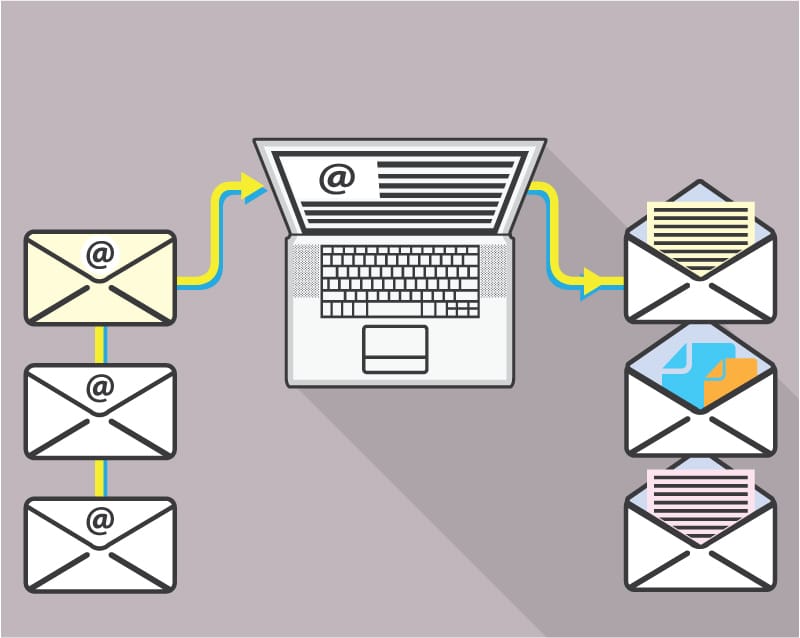
Unfortunately, saving emails can be a clunky process.
And it’s often forgotten.
You can prevent this by using an in-house legal document management system with email management capabilities. Typically, a DMS will integrate with services such as Outlook via an add-in.
This makes it simple to save emails to specific matters with just one click.
Related – Email Management for Law Firms: Learn the ins, outs and best practices of managing email as an attorney.
How to Evaluate In-House Legal Document Management Systems
A DMS can truly transform your processes by providing seamless and efficient document storage and management. Fortunately, there are many options out there to choose from. Your next step is to evaluate and choose the right one for your team.
Here are 5 Questions You Should Ask When Evaluating Any DMS Tool:
Is the DMS Cloud-Based?
The benefits of working in the cloud are no secret.
In all likelihood, your organization uses some cloud-based tools already. After all, the cloud delivers improved collaboration, security, and efficiency. This is why we always recommend cloud-based tools for legal teams.
What are some of those benefits?
First, there’s enhanced security. DMS tools offer security measures such as data encryption, multi-factor authentication (MFA), and geographically redundant backups.
Beyond security, cloud-based tools enable you and your team to access files from anywhere and spend less time tracking down critical data. Plus, cloud-based tools are scalable to meet the needs of your growing team.
When looking for document management for your in-house legal team, you’ll need to do some test driving. You’ll want to select a group of tools you and your team can try out to get a feel for what works and what doesn’t.

Is the DMS Matter-Centric?
The right in-house legal document management system is built with law firms in mind. It will allow you to store and manage files based on each matter automatically, eliminating the clunky mess of folders inside your server or storage tool.
When you or someone on your team needs to find a specific document, file, or email, you’ll find it inside the matter it pertains to. No questions asked.
Does the DMS Have the Features You Need?
The DMS tool you choose should have all of the features your legal team needs. Don’t skip this step—it’s better to choose a tool that fits now instead of wasting time and cash selecting one that doesn’t end up working for your team.
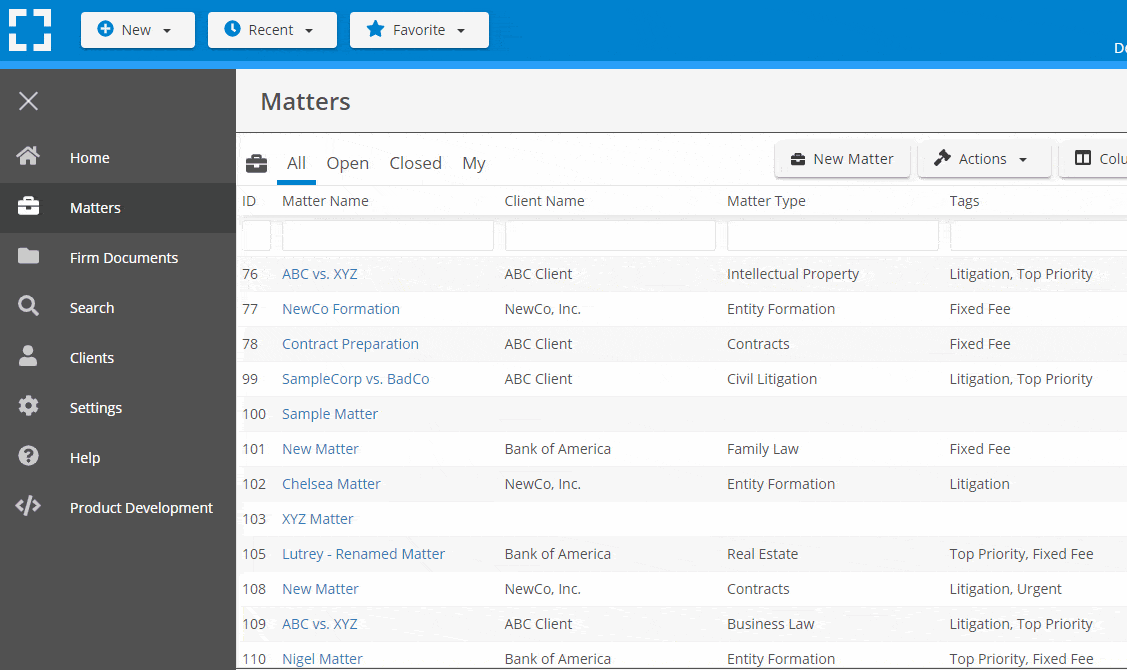
Is the DMS Easy to Use?
Any tool you adopt should be easy for your team to use. Otherwise, it creates more headaches than it solves. Plus, software that’s easy to use will be more easily accepted and championed by your team than a clunky tool.
The DMS should have a simple interface that’s easy to navigate. And, since you’re a busy legal team, it should be easy to learn with a fast implementation process. Remember: support is critical.
Make sure the vendor you choose is available for questions and concerns as you go along.
Does the DMS Fit the Organization’s Budget?
Assuming you already have the go-ahead from management to source a new tool, you’ll need to find one that fits the budget. The cost of an in-house legal document management system will vary. While some require payment annually, others require a monthly payment as well as a payment per user.
While pricing is important for in-house legal teams, we always recommend selecting a tool based on what fits your team’s document management needs.
Nonetheless, check out LexWorkplace's Pricing:
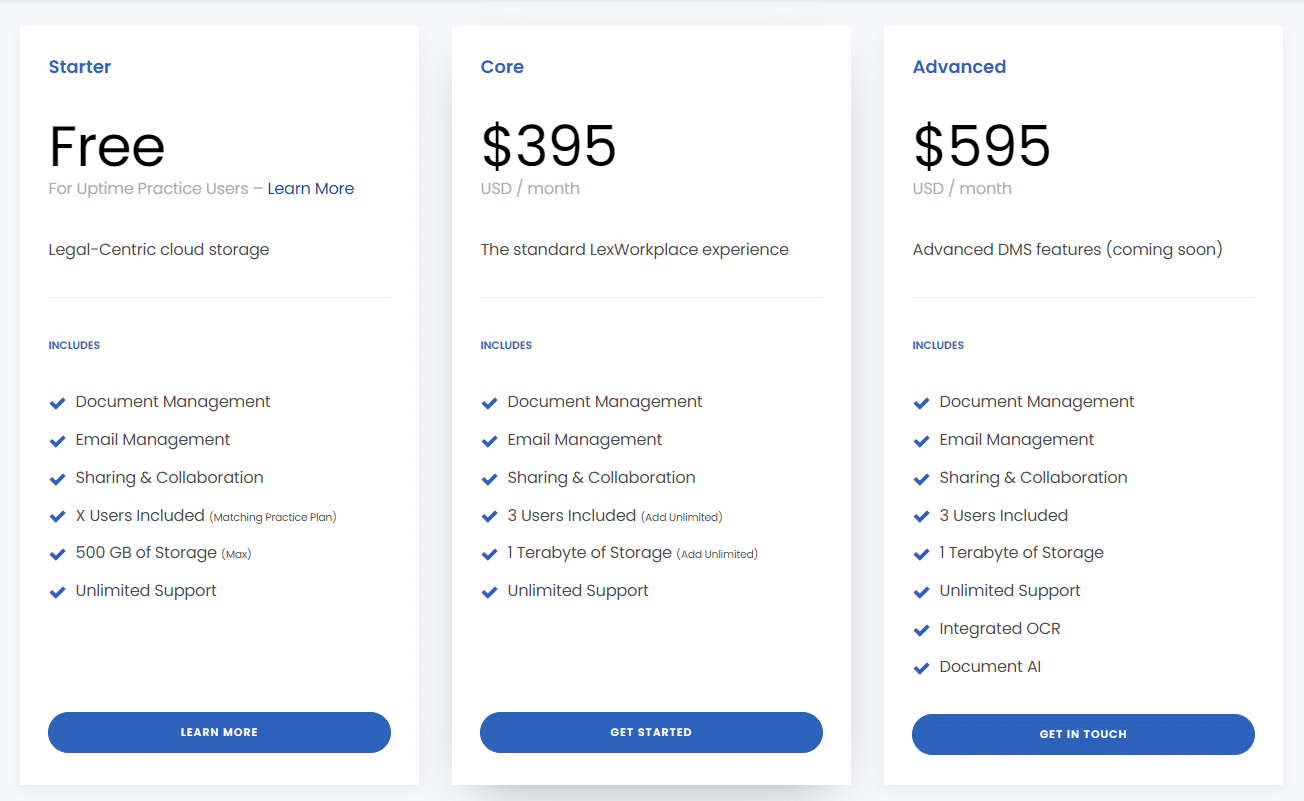
To ensure the tool fits the bill, get your team involved in the selection process. Ask them questions such as:
- What document storage and management processes would you improve?
- What features would make your day-to-day job easier?
- Which features are must-haves and which ones could you live without?
Make a list of the features you need and compare each tool. Which ones deliver the capabilities that will truly impact your team
Related:
Need help? Still not sure which in-house legal document management system is right for you? Our team can help.
We’ve helped hundreds of internal teams just like yours move to the cloud. Reach out to us.
Asking Upper Management for a Document Management System
Addressing the pivotal concern, when advocating for a Legal Document Management System (DMS) within your organization, the internal legal team bears the crucial task of convincing upper management of its necessity.
A primary point to underscore is the specialized nature of a legal DMS, designed specifically for the legal department’s use.
This distinction ensures that the adoption of a legal DMS will not disrupt the existing workflows or systems utilized by other departments. It assures that the integration of a DMS into the legal team’s operations will not necessitate significant downtime or adjustment periods for the rest of the organization. The seamless incorporation of a legal DMS underscores its non-intrusive benefit, allowing other teams to continue their operations unaffected.
Equally vital is articulating the unique needs of the legal department that are currently unmet and how a tailored DMS is essential in addressing these gaps.
The legal team, much like any specialized department, requires tools that are specifically designed to support its unique workflows and challenges. Highlight the specific functionalities that a legal DMS would bring to the team, such as matter-centric organization, advanced version control, and efficient email management, among others.
These features are not just enhancements but are critical in optimizing the legal team’s effectiveness and efficiency. By drawing parallels to how other departments leverage specialized tools—for instance, marketing departments with graphic design software, and sales teams with Customer Relationship Management (CRM) systems—you underscore the necessity of having industry-specific solutions for each department’s success.
In advocating for a DMS, it is crucial to present a clear, concise case that emphasizes how such a system is not merely a luxury but a critical investment in the legal department’s future productivity and the organization’s overall risk management strategy.
This approach not only highlights the practical benefits of a legal DMS but also aligns its adoption with the broader organizational goals of efficiency and specialized excellence.
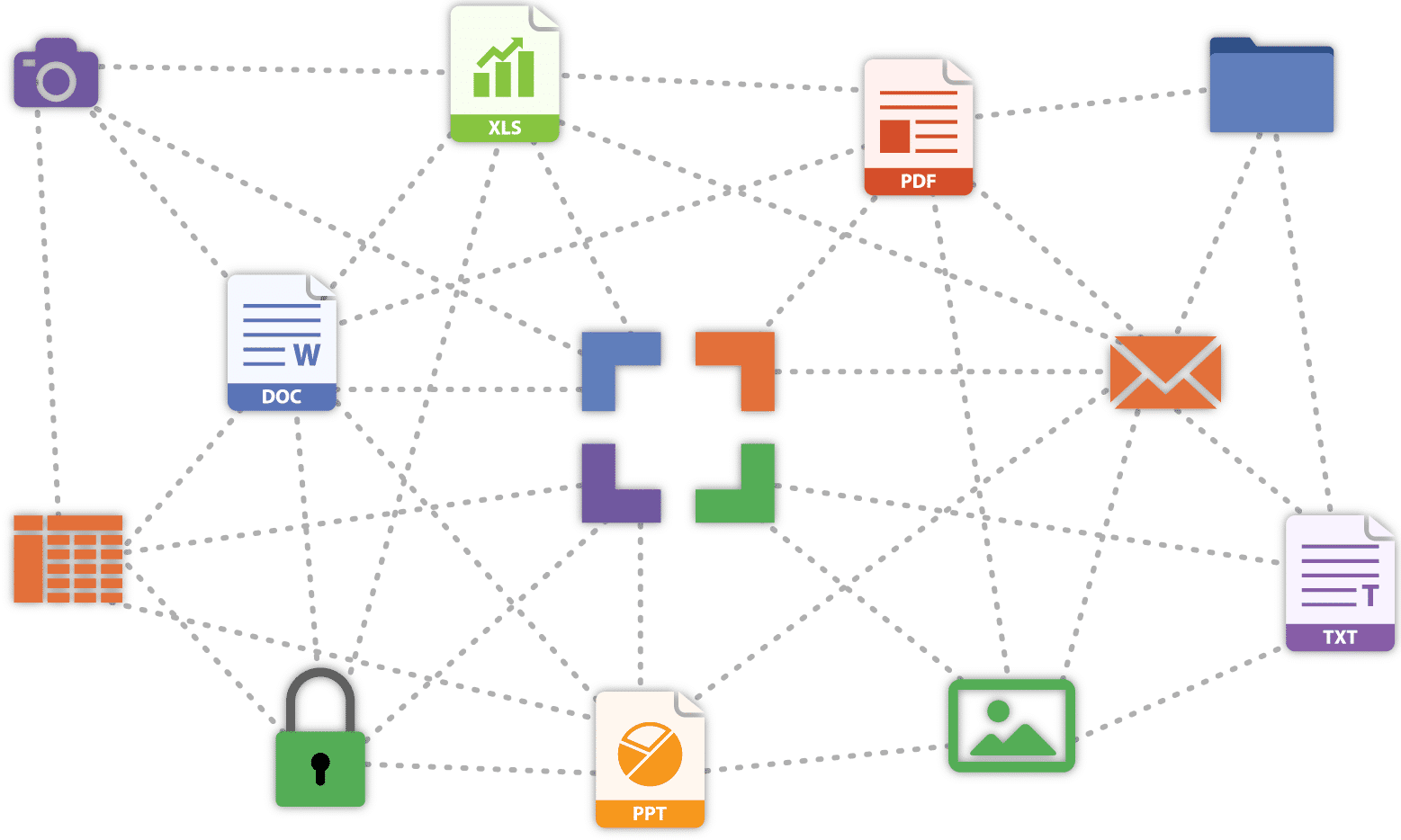
LexWorkplace
Modern Document & Email Management
Cloud-Based. Legal-Centric. Advanced Organization. Various Integrations.
Frequently Asked Questions - In-House Legal Document Management Systems
A DMS for in-house legal teams is a specialized software solution designed to store, manage, and track electronic documents and email related to legal matters. It supports the unique needs of legal departments, including compliance, security, and the efficient handling of legal documents.
In-house legal teams deal with sensitive and confidential information that requires strict compliance with legal standards and regulations. A specialized DMS provides the necessary security, organization, and functionality to manage these documents efficiently, reducing risks and improving productivity.
A DMS tailored for legal teams offers features specific to legal workflows, such as matter-centric organization, advanced search capabilities for legal documents, integration with legal research tools, and compliance tracking. General document management solutions may lack these specialized features.
Yes, many legal DMS solutions are designed to integrate with other legal software tools, such as case management systems, billing software, and legal research platforms, to streamline workflows and increase efficiency across all legal processes.
Important features include matter-centric organization, version control, security and compliance measures, robust search functionality, document tagging and categorization, access controls, audit trails, and integration capabilities with other legal software.
A legal DMS enhances security through features like encryption, access controls, permission settings, and audit trails. These features help ensure that sensitive information is protected and access is limited to authorized personnel only.
Yes, a legal DMS can significantly aid in compliance management by automating record-keeping processes, ensuring documents are stored and managed according to legal standards and regulations, and providing easy access to documents for audits or reviews.
Implementing a DMS streamlines the daily workflow of a legal team by making document retrieval faster and easier, reducing paper usage, automating routine tasks, and facilitating collaboration among team members, even in remote settings.
Legal teams should consider factors such as the specific needs of their legal processes, the size of their team, the volume of documents handled, compatibility with existing software, security features, ease of use, and the level of customer support provided.
Success can be measured through improvements in document retrieval times, reduction in paper usage, enhanced security and compliance, user satisfaction, and overall increases in efficiency and productivity of the legal team. Feedback from team members and regular reviews of system performance against these metrics can provide insights into the DMS’s impact.
Looking for Document Management Software?
LexWorkplace:
Modern Document Management for Law Firms
LexWorkplace is document & email management software, born in the cloud and built for law firms. Here’s a quick primer on how it works, or get your free trial to discover LexWorkplace for yourself.
Organize by Client & Matter
Organize documents, email and notes by client or matter. Store and manage all data for a case or project in one place.

Go Beyond Basic Files & Folders
Supercharge your firm’s productivity with true DMS functions.
- Version Management
- Document Tagging & Profiling
- Document Check-Out / Check-In
- Microsoft Office Integration
- Automatic, Integrated OCR
- Convert Word Docs to PDF
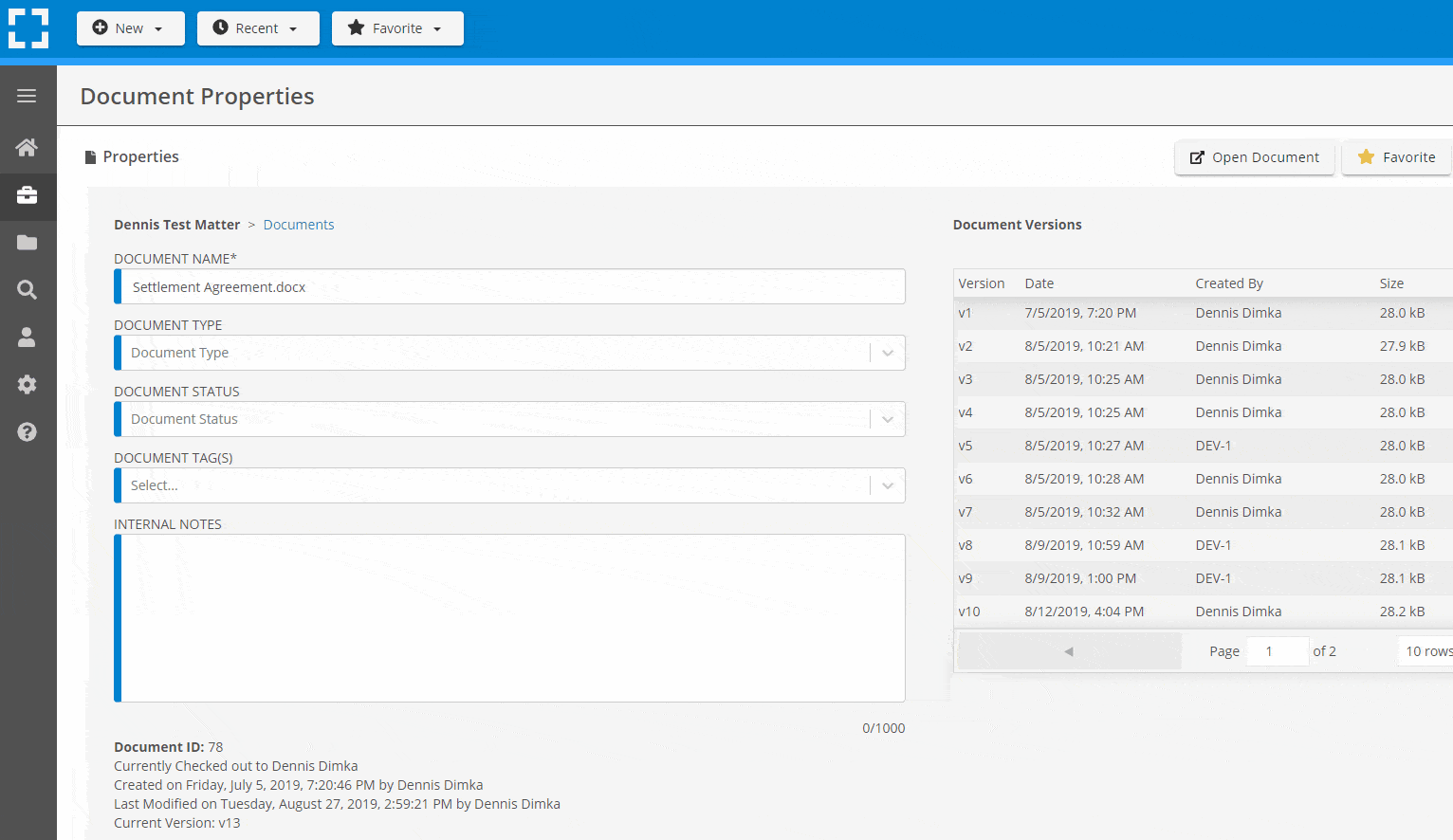
Search Everything
LexWorkplace is like Google for your law firm. Search across millions of pages, documents, folder email and notes in seconds. Refine your search by matter, document type, author and more.
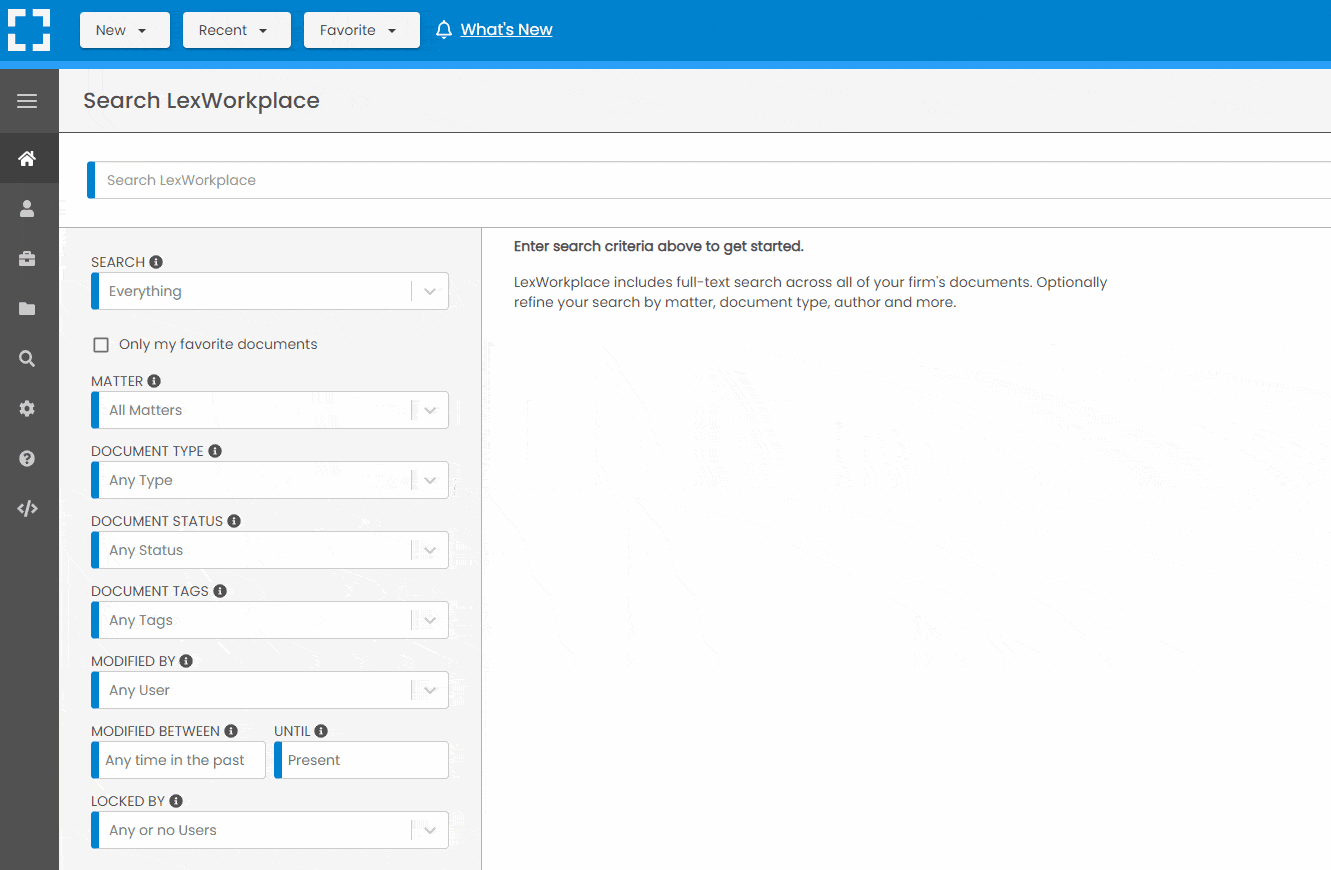
Search by…
- Client or Matter
- Document Type (Contract, Complaint, Order, etc.)
- Document Status (Draft, Final, etc.)
- Document Tags (Filed With Court, Fully Executed, etc.)
Outlook Integration + Comprehensive Email Management
Save emails to a matter without leaving Outlook. Saved emails are accessible to your entire team, organized and searchable.
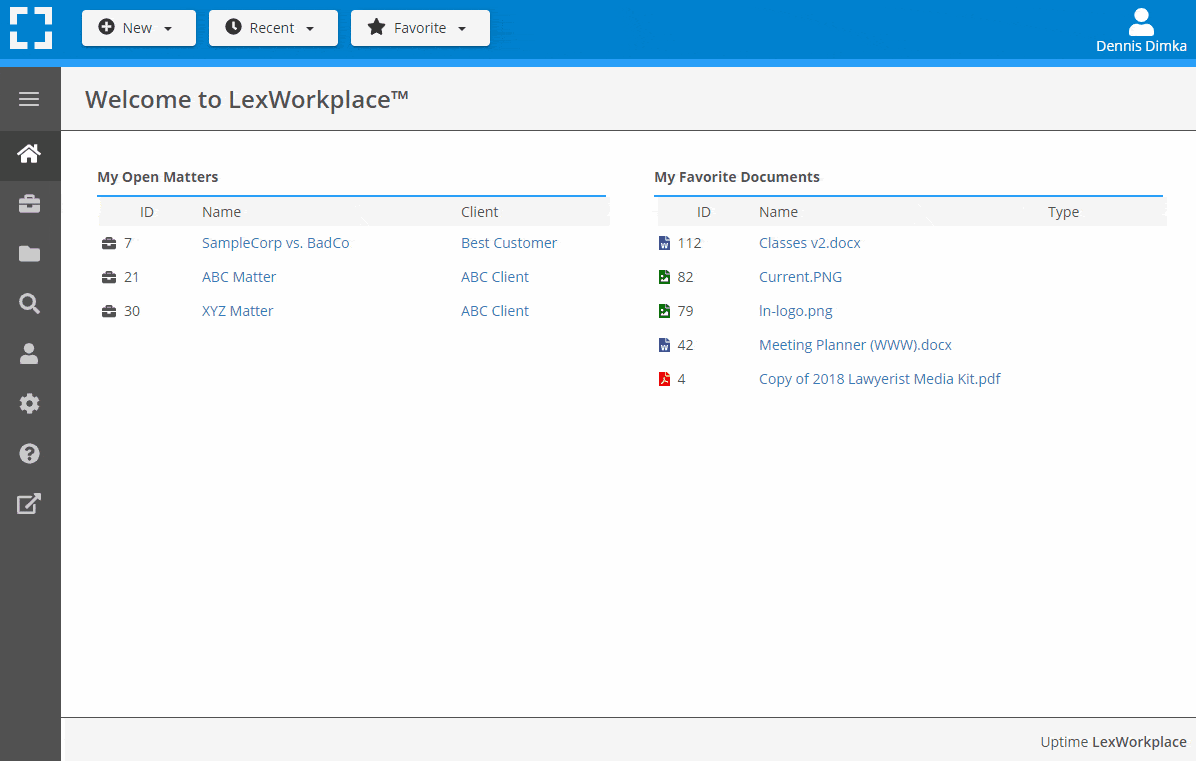
- Outlook Add-In that Works With Windows and Macs
- Save Entire, Original Email to a Matter in a LexWorkplace
- Email De-Duplication
- Organize Emails into Folders, Subfolders
Works with Windows and Macs
All of LexWorkplace is compatible with both Windows and Mac computers.
Next Steps
See What Clients Have to Say
Lawyers love LexWorkplace. See how the system streamlined one lawyer’s practice.
Watch the 5-Minute Demo
See LexWorkplace in action in our quick 5-minute overview and demonstration.
Or, if you want a one-on-one demo, or want to talk about LexWorkplace for your firm, schedule a call or demo below.
You Might Also Like
June 23, 2025
Role-Specific Benefits of Document Management Software for Law Firms
Legal document management software…
Want More Legal Technology Tips?
Subscribe to Uptime Legal to get the latest legal tech tips and trends, delivered to your inbox weekly.

